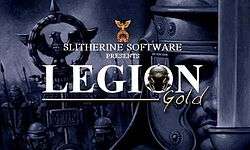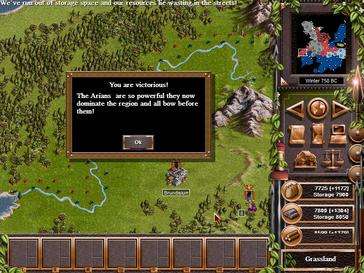Legion Gold
Legion Gold is a turn-based strategy video game with a historical setting, designed by Slitherine and released in 2002. In Legion Gold, the player attempts to build a powerful army by controlling villages and defeating enemies with the ultimate goal of dominating a region.
| Legion Gold | |
|---|---|
 Title screen | |
| Developer(s) | Slitherine |
| Publisher(s) | Strategy First |
| Designer(s) | Iain McNeill |
| Platform(s) | PC, iPad |
| Release | June 6, 2002 |
| Genre(s) | Turn-based strategy |
| Mode(s) | Single player |
Gameplay
Legion Gold is a turn-based single-player wargame. The strategy of battle involves fighting on favorable terrain with enemies weak against the player's units. Other concerns are capturing cities that produce food, stone and wood. Upgrading the cities' buildings leads to the production of stronger units.
Each unit in Legion Gold has its own strengths and weaknesses, different types of attacks (melee and ranged) and weapon.

Legion takes place in the historic setting of the Roman expansion, from the conquest of Italy, Britain, Hispania, Gaul and Germania.
Campaigns
Legion Gold comes with eight campaign maps (including tutorial), each of which has three difficulty levels and options for historical and non-historical gameplay settings. The maps are generally well-researched and correspond closely to historical geography in the names of tribes and locations of cities.
Development
The development release of Legion Gold was in 2002. An iPad version was released on December 31, 2012.[1]
Reception
Legion Gold got a 6.9 on Gamezone,[2] an 8 on Gamevortex[3] and a 7.5 on the Entertainment Depot,[4] amongst others.
References
- "Legion coming to the IPad". 2012-10-19. Archived from the original on 2016-03-04. Retrieved 2012-10-19.
- "Legion Gold Review". 2003-06-03.
- "Legion Gold Review". 2002.
- "Legion Gold Review". 2002.